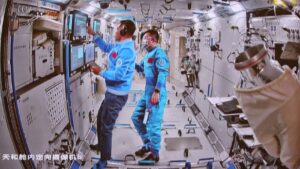DAVOS, Switzerland, Jan. 20 (Xinhua) — (Reporter Qiao Jihong) The annual meeting of the World Economic Forum (WEF) has come to an end, and the town in the Alps, which was crowded with people yesterday, is calm today. How much I hope the world as after the meeting of the town of Davos so quiet and beautiful. However, there are too many issues that need to be addressed in our common home, such as how to rebuild trust? How can we work together to promote global economic growth? How to plan for the future of artificial intelligence? How to tackle the climate crisis? And in Davos, one finds that China’s participation in all global decision-making is indispensable, and the eyes of the world are looking to China on many important issues.
The Chief Economist Outlook report released before the opening of the annual meeting showed that more than half of the chief economists expect the global economy to weaken in 2024, and 70% of the chief economists said that the geo-economic fragmentation will accelerate. As the global economic situation is volatile, can China continue to play an important role as an engine? Just during the Davos Forum, China released economic data showing that its economy grew by 5.2% in 2023, successfully achieving the expected target and also higher than the growth rate of other major economies in the world. According to International Monetary Fund Managing Director Georgieva, the successful realization of China’s main economic expectations last year is good news for China, Asia and the world. Sadia Zahidi, executive director of the World Economic Forum, said the resilience of the global economy will continue to be tested in the coming year. “As one of the world’s major economies, China’s healthy economic development will bring very positive spillover effects to the rest of the world.

“Artificial Intelligence (AI) for Economic and Social Development” is one of the four key topics of this year’s World Economic Forum (WEF) annual meeting. The world is also paying attention to what China thinks and does about this technology that will change the future of mankind. China’s investment in R&D and high-tech industries has maintained double-digit growth for many years, and emerging technologies such as cloud computing, big data, artificial intelligence and blockchain have been accelerated, while new products and new forms of business such as smart terminals, robots and telemedicine are constantly emerging. The new round of scientific and technological revolution and industrial change has brought about a new competitive relationship between countries, and in the town of Davos, “good governance” to promote “good intelligence”, strengthen international cooperation, and bridge the “smart divide”. The voice of China is that only by strengthening innovation can we achieve this goal. China’s voice is that only by strengthening innovation and cooperation can healthy competition be formed and maximum vitality be stimulated.
The search for cooperative solutions has always been an important topic of the Davos Forum. The current global situation highlights the urgency of global cooperation, how will China support multilateralism? On the question of unilateralism or multilateralism, China has always firmly chosen multilateralism. China has repeatedly emphasized that true multilateralism should be based on the basic norms of international relations based on the purposes and principles of the United Nations Charter, and that China will not “break the covenant and withdraw from the group”, nor will it ask other countries to “choose sides”, and that it has always been a resolute force in safeguarding multilateralism. China has always been a firm force in upholding multilateralism. Borge Brende, president of the World Economic Forum, said that many of China’s initiatives are of great significance to the world, such as China’s important role in multilateral trade negotiations and intergovernmental negotiations on climate change, and China’s close cooperation with other countries of the “Global South”, which is playing an increasingly crucial role in maintaining global peace and security.

In the face of the current game between the two forces of openness and closure on the international stage, how will China choose? How will China continue to realize common development with the world? China’s answer is firm and clear: no matter how the world situation changes, China will adhere to the basic national policy of opening up to the outside world, and the door of opening up will only get wider and wider. Over the past 40 years, China has developed itself and benefited the world through opening up. Now China is a major trading partner of more than 140 countries and regions, and the total level of tariffs has dropped to 7.3 percent, close to the level of developed WTO members. According to Georgieva, China will continue to develop along the path of reform, opening up and integration into the world economy. Iweala, director general of the World Trade Organization, said China is a strong supporter of the multilateral trading system and multilateralism. “Global trade benefits China, and China benefits the world.”
Standing in the town of Davos and looking into the distance, the snow-capped mountains and picturesque scenery are like people’s bright expectations for the future prospects of the world, while the muddy and slippery roads underfoot seem to tell the story of the difficult road ahead. However, no matter how many obstacles there are on the road of human development, China will firmly walk hand in hand with the international community, and will continue to contribute its wisdom and strength to building a better world.
Source : www.gov.cn



